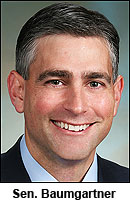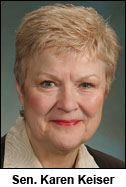STATE GOVERNMENT
Pro-worker bills will be heard in new Senate
Hearings next week on equal pay, Hanford safety net, other labor-backed bills
OLYMPIA (Jan. 5, 2018) — The 2018 session of the Washington State Legislature will begin Monday, Jan. 8. It’s a “short session” — scheduled to end March 8 — but almost anything will seem short compared to the multiple extended overtime sessions that have become routine with a politically divided Legislature in recent years.
The “politically divided” part has changed in 2018 thanks to Manka Dhingra’s decisive victory in the 45th District special election for the Senate in November. Democrats will now have a one-vote majority in the Senate, as well as a narrow majority in the House, so legislative leaders are hopeful that the overtime sessions will become a thing of the past.
It also means that the legislative logjam may break loose. Since 2013, Republican control of the State Senate made that chamber Death Valley for many labor-supported bills that repeatedly passed the House but were killed without a Senate vote.
 But now, things have changed in the Senate, starting with the return of the Labor and Commerce Committee! When Republicans took control of the chamber, they renamed that panel the Commerce and Labor Committee (spot the difference?) And just in case it wasn’t clear how they felt about labor, they appointed Sen. Michael Baumgartner (R-Spokane) as chair, a guy who has repeatedly sponsored legislation to make Washington a so-called “right-to-work” state. He later added “Sports” to the name of the committee, perhaps because his anti-union bills that never had a chance of passage were somewhat of a game for him.
But now, things have changed in the Senate, starting with the return of the Labor and Commerce Committee! When Republicans took control of the chamber, they renamed that panel the Commerce and Labor Committee (spot the difference?) And just in case it wasn’t clear how they felt about labor, they appointed Sen. Michael Baumgartner (R-Spokane) as chair, a guy who has repeatedly sponsored legislation to make Washington a so-called “right-to-work” state. He later added “Sports” to the name of the committee, perhaps because his anti-union bills that never had a chance of passage were somewhat of a game for him.
 In 2018, the Senate Labor and Commerce Committee will be chaired by Sen. Karen Keiser (D-Kent). And with just 60 days to work with, she has already queued up some important bills for public hearings next week. On Wednesday, Jan. 10 at 1:30 p.m., the committee expects to hold public hearings on:
In 2018, the Senate Labor and Commerce Committee will be chaired by Sen. Karen Keiser (D-Kent). And with just 60 days to work with, she has already queued up some important bills for public hearings next week. On Wednesday, Jan. 10 at 1:30 p.m., the committee expects to hold public hearings on:
► SB 5140 (Cleveland) — Concerning enforcement of the equal pay act and worker communications about wages and employment opportunities. This aims to address income disparities, employer discrimination and retaliation practices, and reaffirms Washington’s longstanding pursuit of equality in the workplace. It is expected to amend the existing Washington State Equal Pay Act — not updated since its passage in 1943 — by prohibiting pay secrecy policies, promoting equitable access to career advancement opportunities, allowing discussion of wages, and prohibiting retaliation for asking for equal pay. Thursday’s Senate hearing will be a proposed substitute bill by Sen. Annette Cleveland (D-Vancouver) that’s similar to last year’s HB 1506, sponsored by Rep. Tana Senn (D-Mercer Island), which passed the House 61-36 but was killed without a vote in the Senate. The House Labor and Workforce Standards Committee will be hearing HB 1506 on the first day of session, Monday, Jan. 8 at 1:30 p.m. (See The Stand’s “Strong support in Olympia for Equal Pay Opportunity Act” from Jan. 25, 2017, for more information.)
 ► SB 5940 (Keiser) — Creating the presumption of occupational disease for certain employees at Hanford. While cleaning one of the most toxic places on Earth, these workers are exposed to unknown combinations of the most dangerous chemicals and radioactive materials. By adopting a presumption in our workers’ compensation law that certain cancers and other illness are due to exposure to these hazards, the people of Washington will commit to helping these heroic men and women. Last year, the House version of this legislation, sponsored by Rep. Larry Haler (R-Richland) easily passed on a bipartisan 69-29 vote, but was killed without a vote by Senate Republicans. (See “No safety net for workers at nation’s most dangerous worksite” from the WSLC’s 2017 Legislative Report for more information.)
► SB 5940 (Keiser) — Creating the presumption of occupational disease for certain employees at Hanford. While cleaning one of the most toxic places on Earth, these workers are exposed to unknown combinations of the most dangerous chemicals and radioactive materials. By adopting a presumption in our workers’ compensation law that certain cancers and other illness are due to exposure to these hazards, the people of Washington will commit to helping these heroic men and women. Last year, the House version of this legislation, sponsored by Rep. Larry Haler (R-Richland) easily passed on a bipartisan 69-29 vote, but was killed without a vote by Senate Republicans. (See “No safety net for workers at nation’s most dangerous worksite” from the WSLC’s 2017 Legislative Report for more information.)
► S-3186.1 (a new bill) — Prohibiting employers from asking about arrests or convictions before an applicant is determined otherwise qualified for a position. This legislation addresses a fundamental principle: once a formerly incarcerated person has fulfilled their debt to society, they should be able to secure work. By waiting until after an interview to ask about criminal history, these people will have a fair chance to make their case to potential employers.
On Thursday, Jan. 11 at 1:30 p.m., the Senate Labor and Commerce Committee will hold hearings on a number of bills supported by building trades unions, including IBEW-backed legislation to improve electrical industry safety by requiring completion of an apprenticeship program to receive a journey-level electrician certificate of competency.
The House Labor and Workforce Standards Committee plans to go ahead and take executive action Tuesday on several labor-backed bills that have already been heard — and in some cases passed — by the House.
WSLC’s Shared Prosperity Agenda
 This week, the WSLC released its 2018 Shared Prosperity Agenda of budget and policy priorities will focus on creating family-wage jobs, protecting workers’ safety and health, and making government more accountable to the people.
This week, the WSLC released its 2018 Shared Prosperity Agenda of budget and policy priorities will focus on creating family-wage jobs, protecting workers’ safety and health, and making government more accountable to the people.
“After five years of legislative gridlock, state lawmakers have the opportunity to put people first and focus on good jobs,” said WSLC President Jeff Johnson. “It’s a short session, but important progress can be made on some issues that have been thoroughly studied and considered but blocked by partisan politics.”
Click here to download the full summary of that agenda.
Don’t forget to sign up for the WSLC Legislative Reception and Lobbying Conference in Olympia on Feb. 1-2. All union leaders, staff, and especially rank-and-file members are invited to attend these events and meet with their representatives and senators to discuss issues important to their unions and the state’s labor movement. Click here for more details and registration information.






